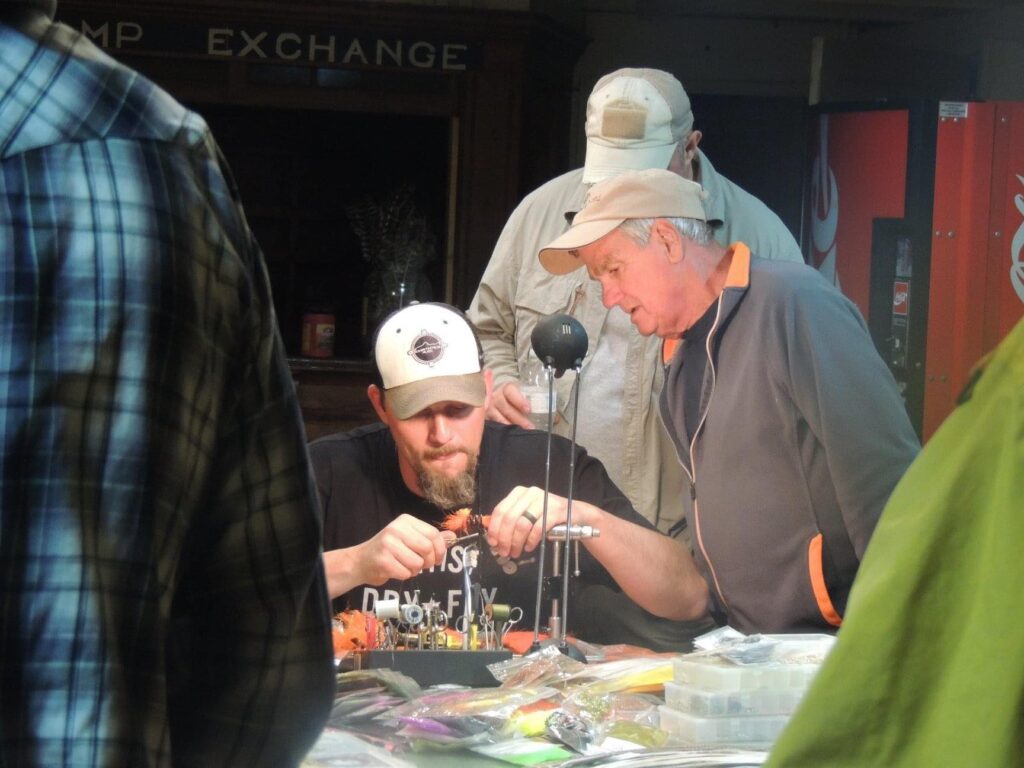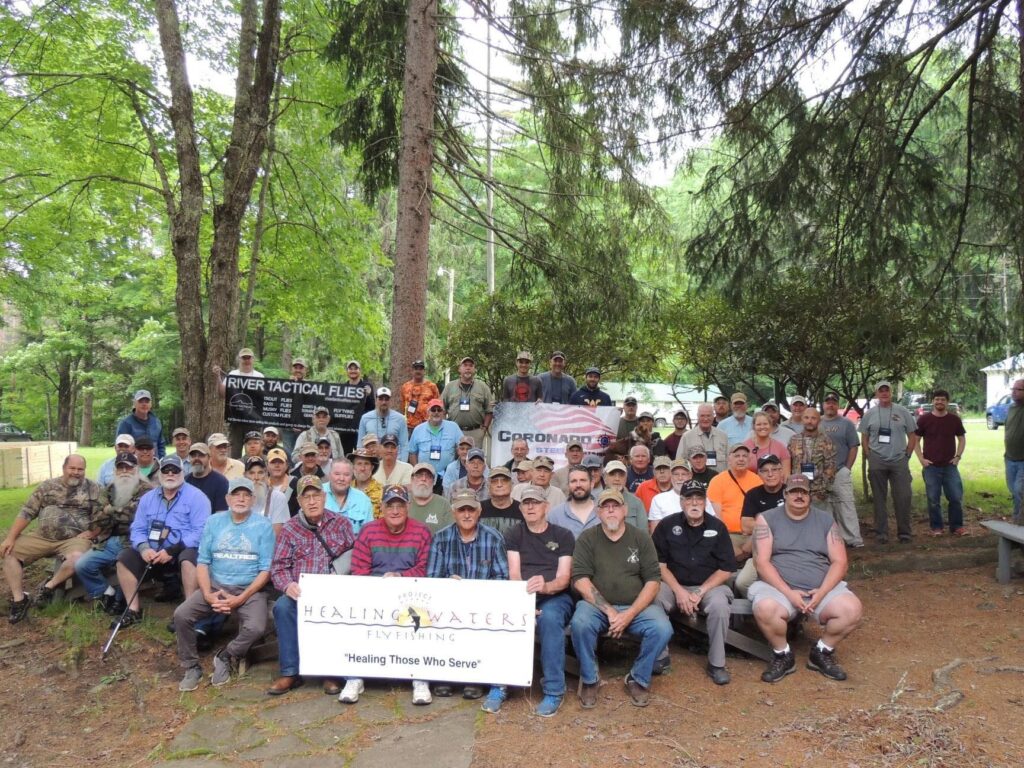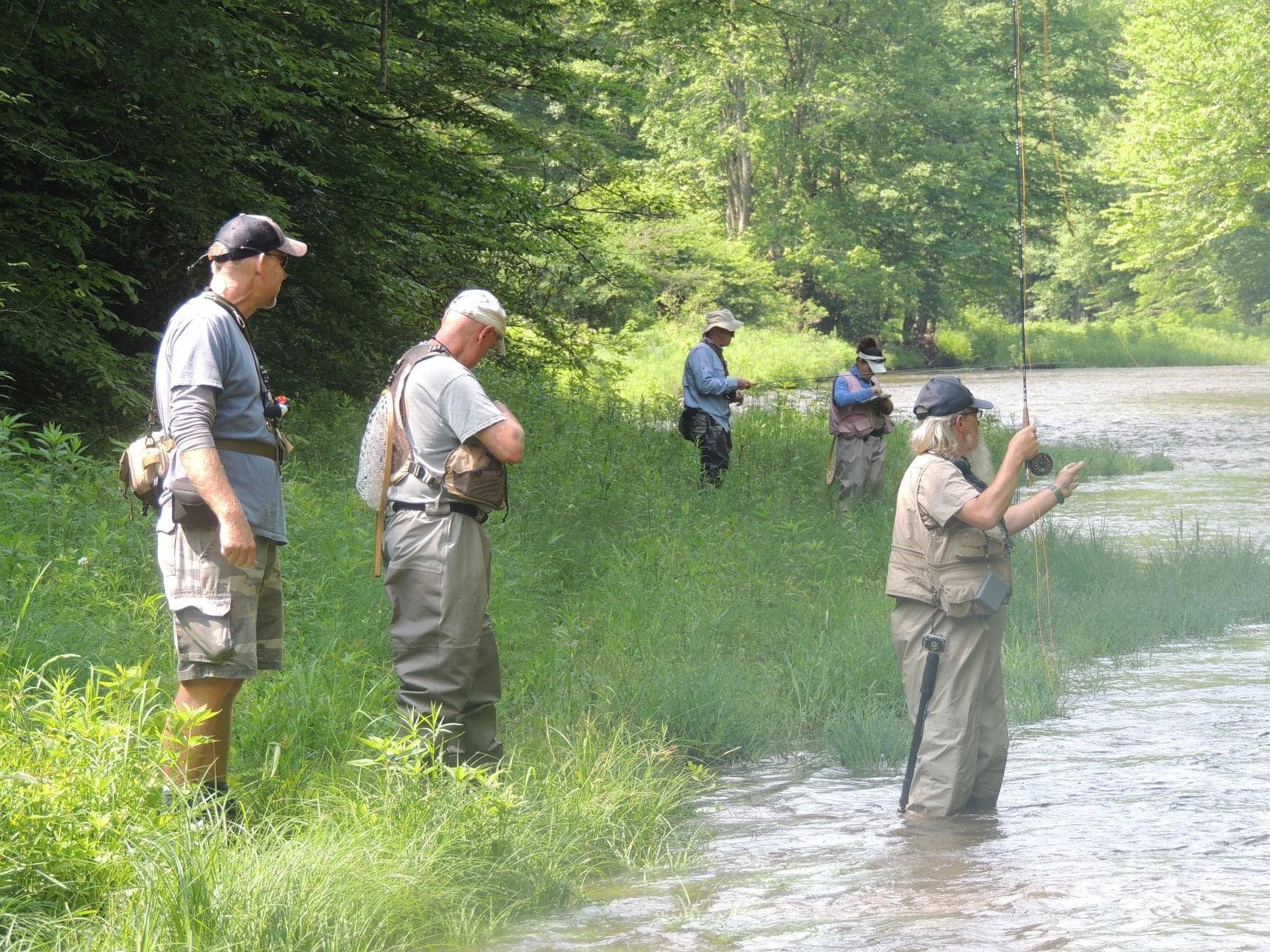PARKERSBURG, W.Va. — What can we give to someone who’s risked it all overseas? The answer is simple for Parkersburg resident Bubba Holt: Healing.
“Healing Waters had just started – it was only a couple years old – and I didn’t know a lot about it,” Holt said. “I was asked to come down and help at one of their events and I did it because, veterans, man. They can take a bullet, least we can do is take them fishing – straight up, that’s the best thing I can tell anybody.”
Holt is the West Virginia regional coordinator of Project Healing Waters, a fly fishing organization that’s dedicated to giving wounded veterans the best fishing experience possible. Founded in 2005 by Ed Nicholson, the organization began serving military members returning from Iraq and Afghanistan that were being treated at Walter Reed Army Medical Center in Bethesda, Md., PHWFF has now expanded across the country. Today, 15 years after its founding, the organization works in Department of Defense hospitals, Warrior Transition Units and Veterans Affairs clinics. According to its website, the organization “brings a high-quality, full-spectrum fly fishing program to an ever-expanding number of disabled active military service personnel,” and that “we focus our resources wherever the need is greatest and expand our partner base in the process. PHWFF has become recognized as an innovative leader and model in the field of therapeutic outdoor recreation for the disabled, through its successful application of the sport of fly fishing as a rehabilitation tool.”
Holt’s answer is also the organization’s motto – “Healing those who serve” – but he lives and breathes trying to heal folks. It’s no gimmick – that motto is the real deal. What makes it even more real for Holt is that, shortly after he began volunteering with the organization, he was in a near-death car accident. Paralyzing him for some time, Holt will tell you he’s a miracle. And while PHWFF gives wounded veterans something to help heal them, it also saved Holt’s life.
“I found out they do care about the people that work with them,” he said. “Some of them kept in contact with my wife every day, and I was just a dude that took some guy fishing once a year. That really left an impression on me and helped me get through a lot of the stuff I went through while I was in the ICU. As soon as I got fit and able, I had the opportunity to start a program in Parkersburg. We started the program and went to Colorado with a guy for two weeks. That’s how I got into the leadership of Healing Waters, and in April 2018 is when I was given the role of regional coordinator.”

Holt remembers a pivotal moment that would spur him to get into his leadership role with the organization. While lying in bed, he thought of a guy, someone he wants to refer to as “Bob” to keep his name anonymous, who wanted to fish the lower waterfalls on Seneca Creek near the picturesque Seneca Rocks and Spruce Knob. Bob, who was in a hard collar after shattering his neck, wouldn’t give in and wanted to get to those falls, even in the cold, December weather.
“Bob wanted to hike up from Whites Run to the falls because he had heard about it for so many years,” Holt said. “And he was a Marine. By god, he was going to hike up to that waterfall, he was going to fish that waterfall come hell or high water. We’re talking December – it’s 26 degrees outside – and I remember thinking, ‘This guy’s going to die on my watch,’ and I was scared to death when I was helping him. I’m a hefty dude, I could carry anyone out on my shoulder, but at that point I was scared. But it was something he wanted to do. The look in his eyes when he was landing those fish made it worth it. Fast forward to when I’m laying in the bed, I thought if Bob can do that then by God so can I. So Project Healing Waters saved my life and I’m not even a veteran.”
Of all the places PHWFF has taken Holt, his favorite spot is at Elk Springs Lodge in Monterville. There, West Virginia chapters meet for their annual Thornwood event which is now the largest in the nationwide circuit. There, participants get to fish the waters inundating the property, including a beautiful spring creek.
“Teaching someone to fly fish on paper, a video or casting in the grass is one thing – having the opportunity to not only hook a fish the right way but how to play a fish the right way, catch, photo and release, and do that multiple times over a 1-hour, 2-hour period it’s so beneficial for our guys,” he said.
He was also quick to point out he’d be remiss if he didn’t mention Knapp’s Creek Trout Lodge in Marlinton and Harman’s Cabins in Cabins, as both do a lot for the organization.
Holt quickly reverted to thinking about an emotional moment that happened at Thornwood, however, pointing out that it solidified why he’s part of PHWFF.
“We have one participant, he’ll get out of his wheelchair and crawl on his elbows to get set up on the creek, sit down and start brookie fishing. He’s hardcore,” Holt said. “It’s amazing watching our participants go through what they go through on a daily basis to overcome whatever obstacle is in their way, whether PTSD or a physical disability.
“That participant got injured overseas with another participant. These guys hadn’t seen each other in 13 years – they got injured at the same time and were sent to different hospitals. One was a participant in Huntington, one was a participant in Beckley, and I paired them up because they had common attributes. [The other] participant was missing part of his leg, so we needed to send them to places that were more accessible for those types of needs. I didn’t know the story, and when we were announcing the names the guy with a prosthetic stood up and said, ‘Is that you?’ The other guy said, ‘Yeah, man, it’s me. Come here, buddy, give me a hug.’ So he walked across the rows, they started hugging and bawling, and we were all wondering what’s going on. One of them goes, ‘We haven’t seen each other in 13 years, we got blown up together!’ It was crazy. That’s why we do Project Healing Waters.”
So, what does the man in charge like to chase in his time off? Is it stocked rainbows, or the Mountain State’s native brook trout?
“I’m a wild and native guy. I’m not going to say I’m a native guy over a wild guy, because I love to fish for brookies but that’s not the only thing I like to fish for. I have trout fished more than you can even imagine – 619 trout streams in West Virginia are on my spreadsheet,” he said. “So anymore, and because of my legs and injury, walking up and down creek banks is tough. But I love to fish for wild trout. When I’m trout fishing, I’m usually with a participant with Healing Waters and in my personal time, I’m just musky fishing. I’m getting to experience the trout with them – I don’t have to catch any more trout in my life to satisfy myself.”
At the end of the day, Holt separates himself from what satisfies him. The work he does isn’t just to make him feel good – although it does. It’s about the group, and how “we” can make a difference in a veteran’s life.

“It’s not about me, it’s about the people that work with us. Man, there are so many people that work with us that make what we do possible in West Virginia. We have dozens of volunteers in our region that take their time, any day you call them. They’re willing to take time off work. The most important commodity in the world is time. In my perspective, anyone who’s willing to give us their time to help our organization, you’re my homie. It’s pretty awesome.”
TWEET @ASpellman_DPost




